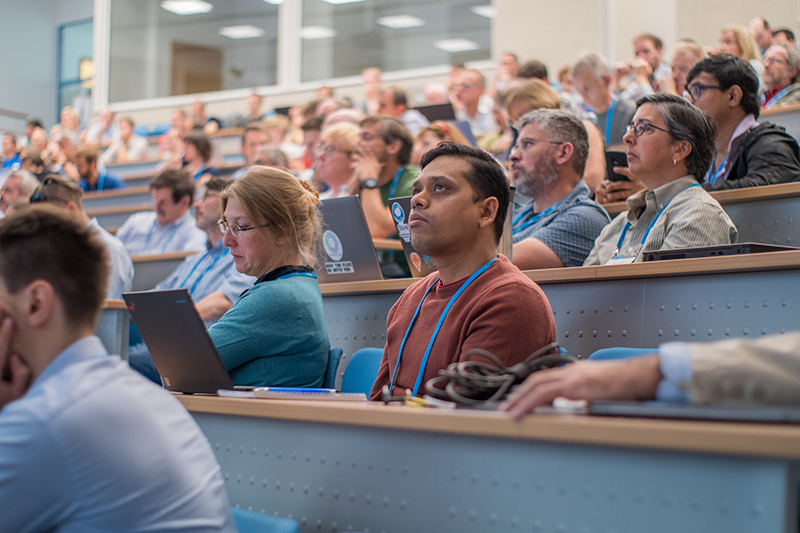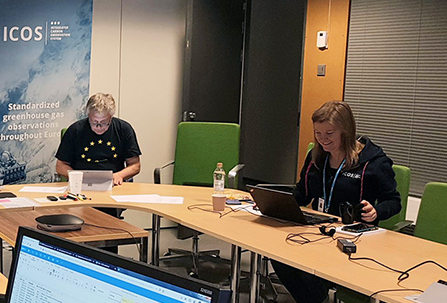Around 500 researchers, 140 stations, 80 universities and institutes, and 13 countries. That’s just some numbers to give an idea of the vast research network called ICOS. What it takes to ensure efficient and smooth cooperation and operation within the network to provide standardised and high-quality data on greenhouse gases? A dedicated person at the heart of the coordination, an Observation Network Officer.
An Observation Network Officer coordinates the cooperation between the station managers (so called Principal Investigators), national Focal Points and the Head Office. Head Office, the organisational hub of the entire ICOS, welcomed MSc Maiju Tiiri as a new Observation Network Officer in June 2020 and said goodbye in the beginning of this year to Dr Syed Ashraful Alam, who had been working in ICOS since May 2018 and moved on to work as a Research Coordinator for the integrated European Long-Term Ecosystem, critical zone and socio-ecological Research Infrastructure (eLTER RI) at the University of Helsinki / Institute for Atmospheric and Earth System Research (INAR) Forest Sciences.
Read what Syed and Maiju reply to the questions on working in the core of the ICOS operations:
So Maiju, how has your journey with ICOS started off?
Maiju: I have really enjoyed the start with ICOS – I think that climate science and reliable observations are the key in fighting the climate change. Being able to work with the best European climate scientists in an international workplace is very interesting and inspiring. My background is in environmental and agricultural ecology but not so much in atmospheric and oceanic sciences, so I feel that there’s something new to learn every day by just attending meetings with scientists.
Syed, among other colleagues in the Head Office, has done a very thorough and valuable job in onboarding me to my role in ICOS. As I started in ICOS in the middle of a global coronavirus pandemic, it has put some challenges on international cooperation and has led me to meet my international colleagues only virtually so far. However, as the digital video conferencing tools have become the norm in most workplaces and the digital tools we are using in ICOS are working well, I think the remote working is going on very smoothly. I hope that I’ll be able to meet my international colleagues in the ICOS community also in person once the travelling is easier again!

How about you Syed, how would you describe your time with ICOS?
Syed: I enjoyed my work at ICOS – the Head Office had a truly great family-like vibe and peer-support was excellent, especially at our unit in operations, although I was slightly bothered by the traditional organisational hierarchy. I’m especially pleased with the results of the first version of the ICOS Handbook for stakeholders that I compiled and which paved the way for the Handbook 2020. Also, I’m happy about writing the ICOS National Network Contracts that brought ICOS stations within the legal framework of data policy and data license.
I also enjoyed my time participating in compiling and writing different reports, such as the Annual Report and the funding application for the Academy of Finland. Contributing to the events, such as the ICOS Science Conference 2018 and several ICOS Ecosystem Measurement Station Assemblies were also great experiences.

Talking about the ICOS Science Conference, Maiju, you had just joined in ICOS after the decision had been made to hold the Science Conference 2020 virtually due to Covid-19 pandemic. How was it to organise such a conference?
Maiju: Turning the entire ICOS Science Conference 2020 to happen entirely online instead of having a physical conference was a huge effort, and the time was very limited – the decision about the virtual conference was taken mid-June and the conference finally took place mid-September. This led to a very hectic start as a new person in ICOS as I was quite intensely involved in the organising of the conference, but in the end we succeeded and it made the entire experience very rewarding. Based on the feedback, the conference participants liked the online conference platform as well as the conference mobile app, and we reached more than 1000 individual participants. We also learned a lot and noted all the aspects to improve, and all these experiences can be taken into account when organising the next ICOS Science Conference in 2022.
Syed, you’re working now at the eLTER RI – how would you see that your experience in these two research infrastructures could be utilised?
Syed: I see my current position as a bridge of cooperation and communication between ICOS and eLTER – the former being an established research infrastructure and the latter an emerging one. Many aspects and lot of knowledge can potentially be transferred from ICOS to eLTER, such as the Impact Assessment Report, the experience with the evaluation report, and the organisation of the biennial ICOS Science Conference.
Likewise, the eLTER Science Case Studies that are currently ongoing within the eLTER PLUS project, especially the studies related to terrestrial ecosystems and socio-ecological aspects, could be useful for the ecosystem domain of ICOS. Currently, I’m compiling the Cost Book and the Cost Benefit Analysis of eLTER RI, and I think that these could be beneficial also for the other research infrastructures. All in all, there are many aspects where we can share our knowledge and help each other to further improve our research infrastructures.
Maiju, would you like to reveal something about the future plans to develop the cooperation between the Head Office and the Principal Investigators & the national Focal Points?
Maiju: Now that Spain has recently joined ICOS, we are going to be working together with the Thematic Centers in onboarding the Spanish stations and the contact personnel into ICOS community and practices. We have been planning to produce new onboarding material for the new Principal Investigators and Focal Points about ICOS, to provide even better support in the future. There are also other exciting plans coming up, but more about them later!